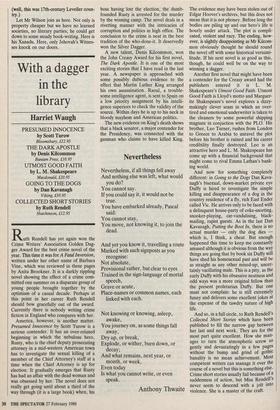With a dagger in the library
Harriet Waugh
PRESUMED INNOCENCE by Scott Turow
Bloomsbury, £12.95
THE DARK APOSTLE by Denis Kilcommon
Bantam Press, £10.95
UTMOST GOOD FAITH by L. M. Shakespeare
Macdonald, £10.95
GOING TO THE DOGS by Dan Kavanagh
Viking, £10.95
COLLECTED SHORT STORIES by Ruth Rendell
Hutchinson, £12.95
Ruth Rendell has yet again won the Crime Writers' Association Golden Dag- ger Award for the best crime novel of the year. This time it was for A Fatal Inversion, written under her other name of Barbara Vine, which was reviewed in these pages by Anita Brookner. It is a darkly rippling novel showing the effect of a crime com- mitted one summer on a disparate group of young people brought together by the optimism of a casual decade. Perhaps at this point in her career Ruth Rendell should bow gracefully out of the award. Currently there is nobody writing crime fiction in England who compares with her.
America, however, is another matter. Presumed Innocence by Scott Turow is a serious contender. It has an over-relaxed beginning in which the nebulous hero, Rusty, who is the chief deputy prosecuting attorney in a mid-western American town has to investigate the sexual killing of a member of the Chief Attorney's staff at a time when the Chief Attorney is up for election. It gradually emerges that Rusty has had an affair with the dead woman and was obsessed by her. The novel does not really get going until about a third of the way through (it is a large book) when, his boss having lost the election, the dumb- founded Rusty is arrested for the murder by the winning camp. The novel deals in a rivetting manner with the intricacies of corruption and politics in high office. The conclusion to the crime is neat in the best tradition of the who-done-it. It deservedly won the Silver Dagger.
A new talent, Denis Kilcommon, won the John Creasy Award for his first novel, The Dark Apostle. It is one of the most exciting stories that I have read in the last year. A newspaper is approached with some possibly dubious evidence to the effect that Martin Luther King arranged his own assassination. Raoul, a trouble- some intelligence agent, is sent to Spain on a low priority assignment by his intelli- gence superiors to check the validity of the source. Within days he is up to his neck in bloody mayhem and American politics.
The new evidence on King's death shows that a black senator, a major contender for the Presidency, was connected with the gunman who claims to have killed King. The evidence may have been stolen out of Edgar Hoover's archives, but this does not mean that it is not phoney. Before long the bodies are piling up and our hero's life is hourly under attack. The plot is compli- cated, violent and racy. The ending, how- ever, is slightly disappointing as Mr Kilcom- mon obviously thought he should round the novel off with some historical verisimi- litude. If his next novel is as good as this, though, he could well be on the way to winning a dagger.
Another first novel that might have been a contender for the Creasy award had the publishers entered it is L. M.
Shakespeare's Utmost Good Faith. Utmost Good Faith is Lloyd's motto and Marguer- ite Shakespeare's novel explores a dizzy- makingly clever scam in which an over- tired and emotional underwriter is taken to the cleaners by some powerful shipping magnate in conjuction with the PLO. His brother, Leo Turner, rushes from London to Greece to Arabia to unravel the plot before his brother is ruined and his career credibility finally destroyed. Leo is an attractive hero and L. M. Shakespeare has come up with a financial background that might come to rival Emma Lathan's bank- ing world.
And now for something completely different: in Going to the Dogs Dan Kava- nagh's bisexual, down-market private eye Duffy is hired to investigate the simple killing and disappearance of a dog in the country residence of a fly, rich East Ender called Vic. He arrives only to be faced with a delinquent house-party of coke-snorting, snooker-playing, car-vandalising, black- mailing, rapist guests. As in the last Dan Kavanagh, Putting the Boot In, there is no actual murder — only the dog dies - which is, I think, a cheat. But enough happened this time to keep me constantly amused although it is obvious from the way things are going that by book six Duffy will have shed his homosexual past and will be as straight as any other mixed-up, uncer- tainly vacillating male. This is a pity, as the early Duffy with his obsessive neatness and odd ways was a more original fellow than the present proletarian Duffy. But one must not complain: he is still extremely funny and delivers some excellent jokes at the expense of the tawdry nature of high life.
And so, in a full circle, to Ruth Rendell's Collected Short Stories which have been published to fill the narrow gap between her last and next work. They are for the most part quite excellent. How she man- ages to turn the atmospheric screw so gently and devastatingly in a few pages without the bump and grind of gothic banality is no mean achievement. Most competent writers can manage it over the course of a novel but this is something else. Crime short stories usually fail because of a suddenness of action, but Miss Rendell's never seem to descend with a jolt into violence. She is a master of the craft.


















































 Previous page
Previous page